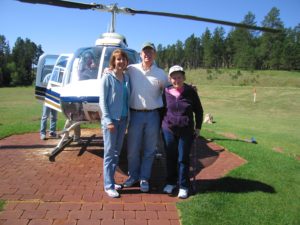I just finished reading a great book, Deep Work: Rules for Focused Success in a Distracted World by Cal Newport. This book taught me many things about myself and how I use my time. I think all doctors would benefit from what I learned.
According to Cal, almost everything we do can be placed into two broad categories; deep and shallow. The deep activities require a block of time to accomplish. When completed, they provide great benefits to you or your career. Shallow activities take up time and can be done quickly but need to be done repeatedly. They use up more time, but never really contribute to our well-being or career advancement. They are also very distracting to our deep thought.
Let’s look at deep vs shallow activities that I experienced as a surgeon. There were many things that filled my day. Some of the deep activities included doing a surgery, studying for an upcoming surgery, studying to learn a new procedure, writing a chapter for a surgical text, and preparing a paper for presentation or publication. These items all are important to my career and my continuing education and require intense concentration and focus.
There are also a lot of shallow items on my daily schedule including: attending committee meetings, sorting through the US mail, looking at and responding to e-mails, watching TV, looking at my social media channels like Facebook and twitter, returning phone calls, and responding to text messages.
This concept that activities have differing values is also touched on by Steven Covey in the Seven Habits of Highly Effective People. The deep things come under the heading of important but not urgent and the shallow things tend to fall in the urgent but not very important. We tend to spend so much of our time doing the shallow things that we never seem to have time to do the deep things, those that are truly important but not urgent.
Cal Newport’s book did a good job of teaching how to make the distinction between deep and shallow projects. He then demonstrates how to organize the day to minimize the shallow items’ encroachment on the deep ones.
There is no way to eradicate all the shallow items in our lives, as the shallow things, like emails, do need to be read and answered. But there are ways to minimize the effect the shallow activities have on interrupting our deep thought.
E-mail, for example, is a way for people to move to the top of our priority list. If our smart phone is set up to immediately inform us of an incoming e-mail, it creates a situation where that bit of information, whether it is important or not, just interrupted what we were doing. If we are deep in thought on an important project, this break in our train of thought costs us a lot of time. It can take ten, even fifteen minutes to get back up to speed on our interrupted deep project.
It would be better for us to set aside a regular time or times each day to handle our e-mail. This way it won’t interfere with what we are doing, as if every e-mail were a life or death message. For example, if I plan to sit down and write one chapter of my next book in the next two hours with no interruptions, I can put my phone on silent and get to work with uninterrupted concentration until the allotted time has expired or I complete the chapter. Then I will take a break from my deep work and look at my new e-mail messages and quickly respond to each of them.
This allows me to give undivided attention to writing my chapter and then give undivided attention to answering my e-mails. If my phone keeps interrupting my writing time, I will be less efficient and will not do as good a job, due to the loss of my train of thought by being interrupted every few minutes.

Especially helpful were the examples of ways to corral our shallow items into their own time slot instead of spreading them throughout the day. As I write this blog, I am in a deck chair on the back of the Holland America Cruise Ship Prinsendam. We are cruising in the Atlantic Ocean thirty miles off the eastern shores of Brazil on our way to the Amazon River. There are no cell towers out here and my phone has fallen silent. Since I am trying to still keep on top of a writing/speaking/coaching business, I do need to respond to some e-mails. I can’t be totally off the grid.
The ship had a very slow internet connection that charges me by the minute to read my e-mail. So I have purchased a package that will allow me to use the internet for 30 minutes a day. This had required me to become very efficient in its use. I can’t just be browsing through Facebook posts of what my friend’s had for dinner last night. I must get down to business. I have found I can cope quite nicely with only being on the web for 30 minutes a day. If I had been home and someone suggested that I only look at my phone for one 30 minute stretch each day, I would have thought that’s not a practical idea. Turns out, it works just fine.
This lack of being distracted by shallow things has allowed me to do more deep things on this trip in less time than when I was working at home. I am able to attend lectures on the sights we will be seeing, write blog articles uninterrupted, enjoy the evening shows, and sit down for dinner with my wife and traveling companions for two hours of good conversation. In essence, since I am able to give my undivided attention to my writing here on the ship, I am able to more fully enjoy the remainder of the time cruising. Balancing time for play, visiting, exploring and working makes the trip very rewarding and fun. I only work a few hours a day and can do so from anywhere in the world.
When I return home form this trip, I need to take this new knowledge and plan my life with the separation of deep things and shallow things in mind. We have all heard the saying “work when you work and play when you play.” The distractions of constant connectivity tend to hurt that philosophy. We bring our home life to work and our work life home. This is not a good combination. Very few doctors, or any profession for that matter, need to continue to work after they come home for the day, unless they are on call. If the time we spend at work can be spent more effectively, then the time we spend at home with our family can truly be with the family.
Following are three steps to gain time for deeper things:
1: Set times of the day to connect to the internet, and only go online during those set times. Resist the urge to pick up the phone and search for something on the net.
2: Schedule blocks of time to devote to deep thought projects. Give yourself a chance to get deeply into the project with no interruptions. Blocks of time are needed.
3: When you come home at the end of the day, stop working. Spend the time with your family. Be more effective during your work hours, so you can have more fun during your play hours.
Pick up a copy of Cal Newport’s book and see how you can change your productivity level and increase your enjoyment of life.
How about you? Have you had times in your life when you scheduled time for deep activities? How did it go? How did you minimize your distractions? Do you need a little internet taming in your life?
